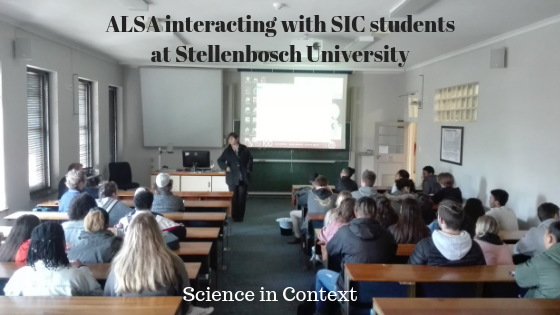The Faculty of Science at Stellenbosch University added a new compulsory module, ‘Science in Context’ to be completed by all first year BSc students.
The purpose of the module is to expose students to the benefits of integrating knowledge from different disciplines, when approaching scientific topics (also see video below). This will enforce students to collaborate with one another in their chosen group (maximum 5 students (multi-disciplinary) per group), in a similar way scientists from various disciplines often collaborate. This module will lay the foundation for core skills that any science student require to become a successful BSc graduate. These skills include: communication skills, basic computer skills and essential graduate attributes.
Students have been given the task to conduct a literature study of their chosen topic. “This literature study needs to be multidisciplinary in nature, thus indicating how knowledge from at least three science disciplines contributes to addressing the specific problem, or contribute to explaining the specific event (topic) chosen” (Science in Context 178 Project Brief, 2018).
Students had the opportunity to choose from 30 topics, seven of these topics are Antarctic related. These seven topics were suggested in conjunction with the Antarctic Legacy of South Africa (ALSA), making the ALSA project one of the key role players in this module.
The seven Antarctic related topics are:
- Discuss the possibility of moving an ice block from the Antarctic region to Cape Town to supplement the current water supply;
- Marion Island is a natural laboratory. Discuss the influence this has on the type of research that is conducted on this island and the way in which research is conducted. Also consider the impact that the extreme weather has on researchers, their instruments and the way they conduct field work;
- Scientists and researcher spend two to 14 months in isolated and extreme weather conditions with limited contact with family and friends. How does one prepare for such an expedition? Various aspects can be considered, including physical and psychological health, diet, and specialised clothing;
- Researchers have taken images of Antarctica and Marion Island over the past number of years, and these images are available for research purposes. Is it possible to do a preliminary study of climate change with the aid of these images?;
- South Africa has a weather station on Gough Island. Consider the workings of this weather station and what value it has for South Africa. What kind of information does the weather station gather, what equipment do they use and how do they manage to launch a weather balloon in such conditions?;
- Green living / Living off the grid: Consider the methods that Antarctic research teams from South Africa and other countries use to minimise their impact on their environment and to survive in extreme conditions. Can similar methods be applied to improve or promote so-called Green living / Living off the grid initiatives?;
- Invasive species can have devastating effects on their environment. Consider the mice invasion on Marion Island. How did it happen, why is it problematic and what can be done about it?
In total 154 students chose one of the 7 topics. Students will also need to present their work in a 10 minute PowerPoint presentation which will also give the rest of the 596 students the chance to learn more about these Antarctic related topics. ALSA will be involved in the assessment hereof.
ALSA would like to wish all students good luck with this module and we look forward to the outcomes.
This is a video by Dr Ilse Rootman-Le Grange, Faculty of Science – explaining to the first year students what the Science in Context Module is all about.
Anche Louw, Antarctic Legacy of South Africa, Department of Botany and Zoology, Stellenbosch University, 13 September 2018.

